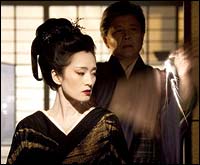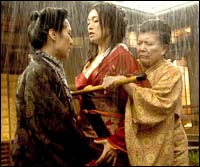 | « Back to article | Print this article |
 Like the love story told a million times before, the story of geishas in cinema has remained unchanged.
Like the love story told a million times before, the story of geishas in cinema has remained unchanged.
Adapted from the book Memoirs of a Geisha by Arthur Golden, and set in 1930s Japan, it tells the story of a young girl Chiyo (Suzuka Ohgo) and her journey from being sold by her family to becoming a celebrated geisha, while pining for her true love (think Umrao Jaan, Pretty Woman and a myriad others).
The geisha house Chiyo is sold into is ruthless. She has to deal with cruel reigning queen Hatsumomo (Li Gong) who is insanely jealous of her, and a cold-blooded matron. She remains a servant girl for a long time, until another matron Mameha (Michelle Yeoh) turns mentor and insists on converting her into one of the most desired of geishas. Her mentoring comprises tips on how to get and keep a man's attention, beauty makeovers ("agony and beauty go side by side"), tutoring in dance and conversation and explaining the real meaning of a geisha.
Strangely, while we are repeatedly told that geishas are "moving works of art, who do not sell their bodies," we see Chiyo's (now known as Sayuri) virginity auctioned to the highest bidder. There is a cold cruelty in the mechanics of the trade -- from rivalry to the nonchalance and manipulation with which a girl's virginity is sold.
But Sayuri's heart longs for that one man, the one she calls Chairman (Ken Watanabe). The one who was kind to her years ago when she was a little girl. With the passing of time, Sayuri's love has only grown, despite the age gap that raises a few questions. It makes you want to decry the stupidity of such feelings, while pitying a mind that yearned love so much, it fell for the first touch of kindness.
Like in most films about prostitutes or geishas, the central character is pure as snow and shines like a lone star through all the muck. She is kind and chaste, almost inhumanly so. I found several parallels between this film and the 1981 classic Umrao Jaan, especially the focus on music and dance. You may also find yourself remembering scenes from The Geisha House (1999).
 Performance wise, this is a treat. Young Suzuka Ohgo as the child Chiyo, with her earnest blue eyes, will steal your heart. As Sayuri, Zhang is subtly beautiful and magnificently nuanced. As the jealous Hatsumomo, Li Gong is superb and has already garnered several nominations for her performance. The casting of Chinese actresses in the three central geisha roles kicked up a controversy that led to fiery opinions by the Japanese media and a banning of the film in China. Though the geisha culture is Japanese and it was argued that only a Japanese actor could get the nuances right, director Rob Marshall (Chicago) stood steadfastly behind his choices.
Performance wise, this is a treat. Young Suzuka Ohgo as the child Chiyo, with her earnest blue eyes, will steal your heart. As Sayuri, Zhang is subtly beautiful and magnificently nuanced. As the jealous Hatsumomo, Li Gong is superb and has already garnered several nominations for her performance. The casting of Chinese actresses in the three central geisha roles kicked up a controversy that led to fiery opinions by the Japanese media and a banning of the film in China. Though the geisha culture is Japanese and it was argued that only a Japanese actor could get the nuances right, director Rob Marshall (Chicago) stood steadfastly behind his choices.
Incidentally, Mineko Iwasaki, the geisha on whom the book is based, disapproved of it. She felt that showing geishas as borderline prostitutes was incorrect. She hated the invasion of a writer and director's creative license on her life story.
Even technically, Memoirs is marvellous. The cinematography (Dion Beebe, Chicago) is brilliant and unobtrusive, letting the story hold centre stage. The music is ably supportive, never out of tune with the scene's moods.
Which brings us to a pertinent question. What is the exotica quotient of the film versus the soul? I believe it succeeds in keeping the story as its focus; it doesn't overtly romanticize or exoticise the premise. It is a neutral eye, not the eye of an American caught in the candy shop of Asian exotica.
Memoirs has garnered several nominations in the upcoming Oscars, including best costume design, cinematography and sound. I felt it should have been in the running for best picture as well, for its achievement in storytelling. For making the audience feel for the central character to such an extent that, even after the film is over, you want someone to assure you that Sayuri is going to be okay.
If that's not great storytelling, what is?